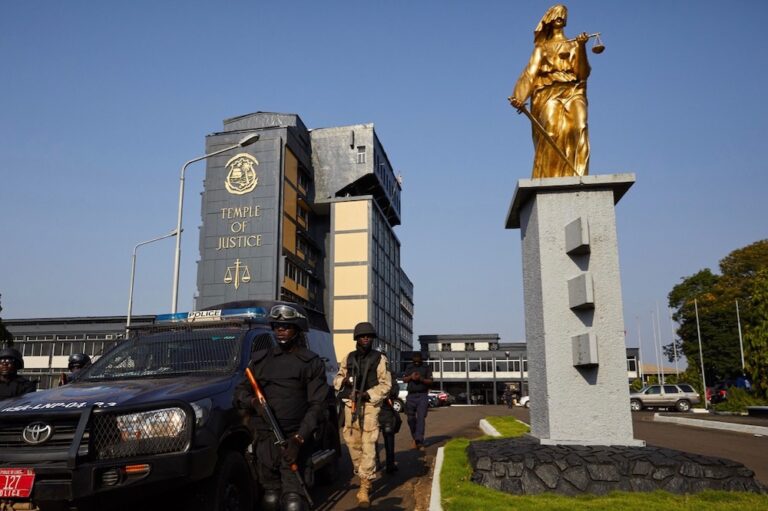(RSF/IFEX) – RSF has expressed serious concern after the arrest of Hassan Bility, editor-in-chief of the private weekly “The Analyst”. “The newspaper is well known for its highly critical attitude towards President Charles Taylor, and we hope that the accusation of ‘plotting against the President’ is not a pretext for silencing a journalist who is […]
(RSF/IFEX) – RSF has expressed serious concern after the arrest of Hassan Bility, editor-in-chief of the private weekly “The Analyst”. “The newspaper is well known for its highly critical attitude towards President Charles Taylor, and we hope that the accusation of ‘plotting against the President’ is not a pretext for silencing a journalist who is very critical of those in power,” said RSF Secretary-General Robert Ménard in a letter to Liberian Information Minister Reginald Goodridge. “We are concerned that this may be a witch hunt against journalists who criticise government policies,” he added. RSF called on the minister to provide proof of the accusations as soon as possible or release Bility.
RSF has learned that “The Analyst” editor-in-chief was detained by security agents on 24 June 2002. He is accused of collaborating with the rebel group Liberians United for Reconciliation and Democracy (LURD). According to the information minister, Bility is a “central figure among those who have been running cells in Monrovia actively collaborating with LURD terrorists, as well as their supporters in the United States of America.” The authorities have announced that they have seized several e-mails sent or received by the journalist, which they claim prove his links with the rebel group. A spokesperson for LURD, speaking from abroad, said that Bility was “not a member of LURD, not even a sympathiser,” adding that he was also highly critical of LURD.
Bility is being held at the National Security Agency (NSA) in Monrovia. Two other unidentified individuals were also arrested on the same accusations.
RSF notes that in February, four journalists with “The Analyst” were detained for 24 hours because of several articles which, according to the authorities, were “not out for peace” and “poisoned the minds of the people.” In addition, on 26 April, the police searched the newspaper’s offices and ordered it to be closed down (see IFEX alerts of 29 April, 22 and 13 February 2002). The president personally authorised the newspaper’s return to the newsstands a month later.


